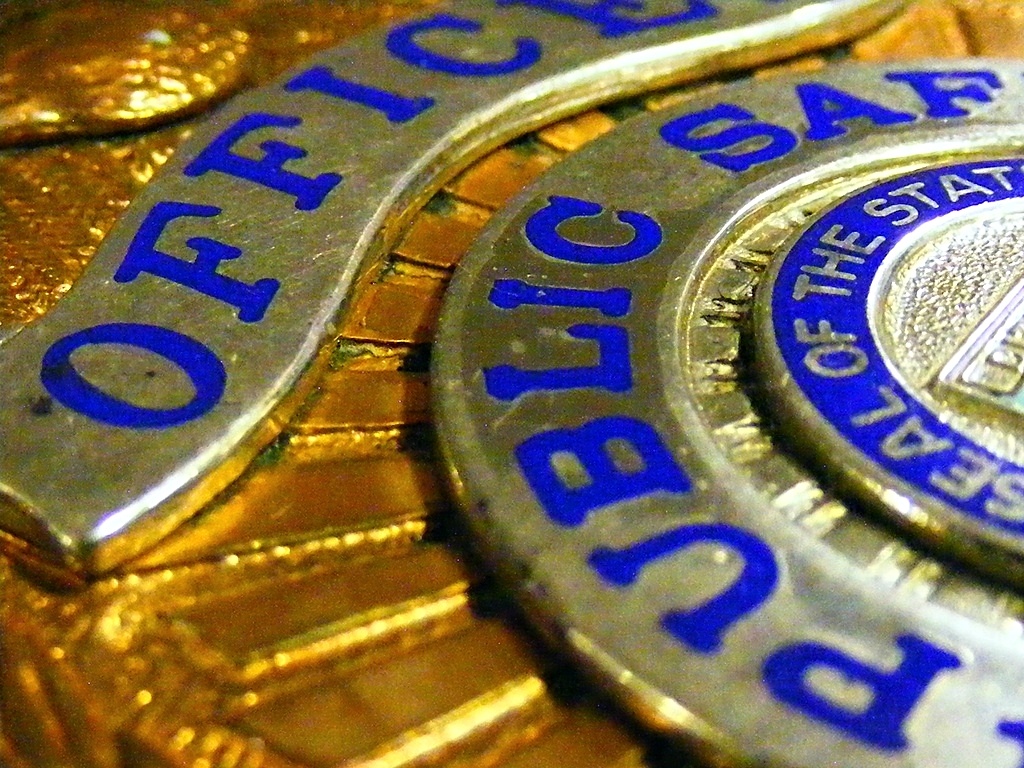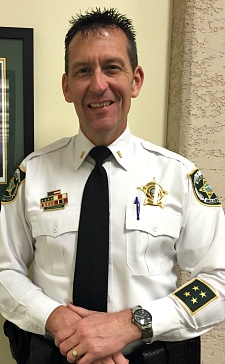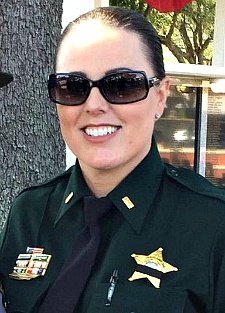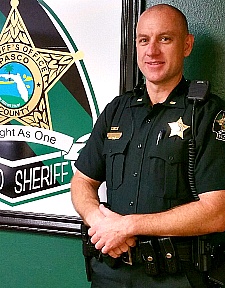Beyond The Badge
During National Police Week, veteran officers in Saint Leo's graduate criminal justice program offer a few thoughts about a career in law enforcement.

During National Police Week, veteran officers in Saint Leo's graduate criminal justice program offer a few thoughts about a career in law enforcement.


At the age of 23, Michael Farrier was in a dead-end job and unsure of what he wanted to do with his life. What he wanted most was a career he could be proud of. He found that career in law enforcement. Now a lieutenant, he started as a detention deputy with the Hillsborough County Sheriff's Office 21 years ago.
Laura Rhodes, a sergeant with the Polk County Sheriff's Office, has been in law enforcement for 15 years. Her motivation for entering the field? "A passion for the law and a desire to protect and serve citizens," she says.
Kimberly Riggans has worked for Pasco Sheriff's Office for 17 years and is now a lieutenant. Her reason for going into law enforcement was similar: "to make a difference in the lives of others."
Thirteen years ago, after serving as a military police officer with the Florida National Guard, Lieutenant Tait Sanborn joined the Pasco County Sheriff's Office. He says that he remains committed to law enforcement because, "in addition to nursing and teaching, it is one of the top three most honorable professions I can think of."
Looking for meaningful careers where they could contribute to society, these four public servants and members of the Saint Leo University community chose law enforcement, remaining steadfast over the years in their commitment to stand between good and evil in society, despite the challenges and dangers of the job.
Dangers that are all too real, all too often.
A police officer is killed in the line of duty in the United States approximately every 2½ days. In 2015, 124 officers lost their lives. Those officers will be honored this week during National Police Week observances held annually beginning on May 15 in our nation's capital. Their names will be added to the more than 20,000 names of officers killed in the line of duty dating back to the first death in 1791 that are inscribed on the National Law Enforcement Officers Memorial in Washington, D.C.
National Police Week draws tens of thousands of officers from around the world, law enforcement families and supporters to honor the service and sacrifice of U.S. law enforcement officers through a variety of events including a Blue Mass, candlelight vigil, unity tour to raise money for the National Law Enforcement Officers Memorial Fund and memorial service.
What motivates individuals to assume the risks and difficulties of a career in law enforcement? Why do they stay and what does the badge represent to them?
Michael, Laura, Kimberly and Tait are all members of the Saint Leo community – Michael a recent graduate of the university's online master's in criminal justice program, and Laura, Tait and Kimberly current students in the program.

Here they share a few thoughts on what a career in law enforcement has meant to them.
What was your motivation for going into law enforcement?
When I moved to the Tampa area in 1992, I was in a transition period and was looking for a career path. Driving home one day, I noticed a sign indicating the Hillsborough County Sheriff's Office was constructing a new jail and thought it may be something I'd be interested in. I applied, and after a long and tedious hiring process, received a call asking if I was still interested in a job as a detention deputy. I was ecstatic and gave a resounding yes. So I guess my motivation was to begin a career I could be proud of.
Why have you remain committed to law enforcement?
Because I believe deputies and officers can make a difference in their communities and in individuals simply by how they interact with them. I am now in a position where I can have an influence on younger deputies and staff members who are the future of the profession. Influencing them to maintain an attitude of service and commitment to the communities and inmate populations they serve is an industry legacy I hope to cultivate.
What are the most important qualities of a good police officer?
There are many characteristics and qualities a police or detention officer should possess many of which match the core values of Saint Leo University. Most important are commitment to service, honesty, integrity, an ability to maintain composure in stressful situations, understanding, and an ability to see facts clearly while removing personal biases.
What is the best career advice you could give someone entering the field?
I would advise anyone wishing to enter the criminal justice profession, more especially corrections, to do so with humility, confidence, and compassion. Anyone can wear a badge, but the badge does not make nor define the person. Everything is earned, not given.
What does the badge represent to you?
To me the badge brings a sense of pride and honor. By wearing a badge I represent a profession dedicated to serving people and helping those who otherwise may not be able to help or protect themselves. Whereas the badge also represents authority, it is authority that is earned and given by the people we serve. Authority and respect are not simply given, they must be earned. They must be earned through treating people with respect and empathy all the while being fair and doing what is right. Overall, the badge represents honor, sacrifice, professionalism, integrity, and commitment.

What was your motivation for going into law enforcement?
A desire to protect and serve the citizens and a passion for law.
Why have you remain committed to law enforcement?
I remain committed to law enforcement because I enjoy protecting and serving the citizens.
What are the most important qualities of a good police officer?
Courage, integrity, honor, ethical, self-initiative, accountability, civility.
What is the best career advice you could give someone entering the field?
Your honor courage and commitment should be the force that drives you and these attributes should be maintained continuously through training, education and self-assessment.
What does the badge represent to you?
Honor, courage and discipline.*

What was your original motivation for going into law enforcement?
I wanted to do something important with my life and make a difference in the lives of others. I always thought law enforcement was such an honorable and selfless profession.
Why have you remain committed to law enforcement?
I truly believe in what law enforcement stands for. I believe in protecting others and in making our community a better, safer place. I believe in doing the right thing, even when it's not the popular thing. Most importantly, I want to do my part to ensure my children have a safe, solid and cultivating environment to grow up in.
What are the most important qualities of a good police officer?
Integrity, internal fortitude, courage, kindness and patience.
What is the best career advice you could give someone entering the field?
Stay true to yourself and always do the very best you can, even if it doesn't seem to matter to anyone but you. Don't let the negative that will surround you change who you are or the decisions you make. Always find strength in the people you care about, your family and God.
What does the badge represent to you?
My badge represents honor, integrity, strength, commitment, excellence, camaraderie and brotherhood.

What was your original motivation for going into law enforcement?
I wish there was a great story to tell about how I got into law enforcement, but the truth is that I never intended to enter the field as a college student. I studied engineering and aviation in college and had goals were more focused on making money than being part of a community. Then, as often happens with young men, I met a girl. My goals started to change and take on a family and community centric focus while offering a little more excitement than other options held. I left school, joined the Army, attended the police academy, then got married and started a family.
Why have you remain committed to law enforcement?
The best way to answer this question is with a question. Why would I leave? The need for law enforcement has not changed, I still have to provide for my family, and it is one of the top three most honorable professions I can think of (nursing and teaching being the other two)
What are the most important qualities of a good police officer?
There are many skills that an officers needs such as analytical thinking, the ability to effectively communicate orally and in writing with a wide range of people from diverse backgrounds, etc., but the two most important innate qualities are humility and integrity.
What is the best career advice you could give someone entering the field?
Make sure you have the support of your family and learn to write well.
What does the badge represent to you?
I see the badge as a trust between the community and the officers. Should that trust ever be broken, the badge becomes meaningless.
*Sgt. Rhodes' views and opinions do not necessarily represent those of the Polk County Sheriff's Office.
Other posts you may be interested in reading:
Looking To Move Up In Public Safety Administration?
Critical Incident Management: A Career With Impact
Preparing For The Unpredictable
Starting A Career In Critical Incident Management
Do Graduate Degrees Pay Off [Infographic]
Image credits: Flickr/Creative Commons and courtesy Saint Leo students and alumnus